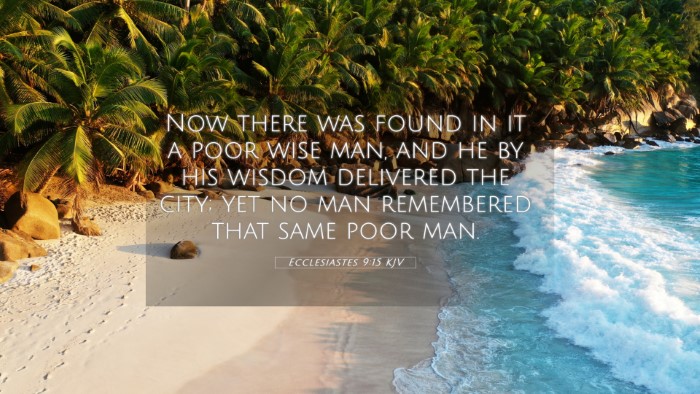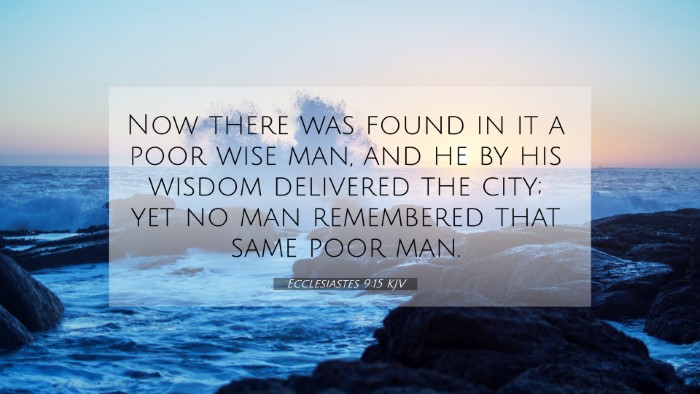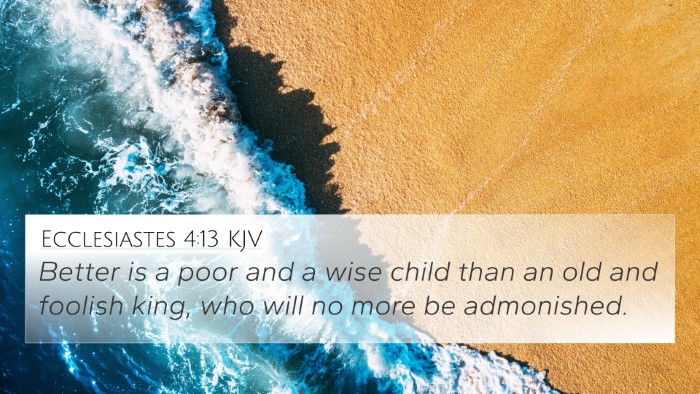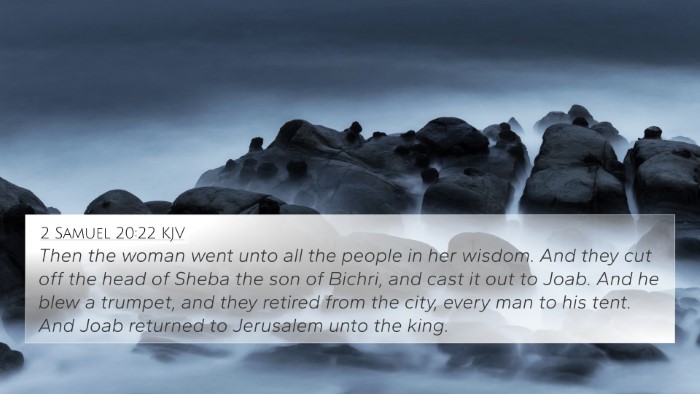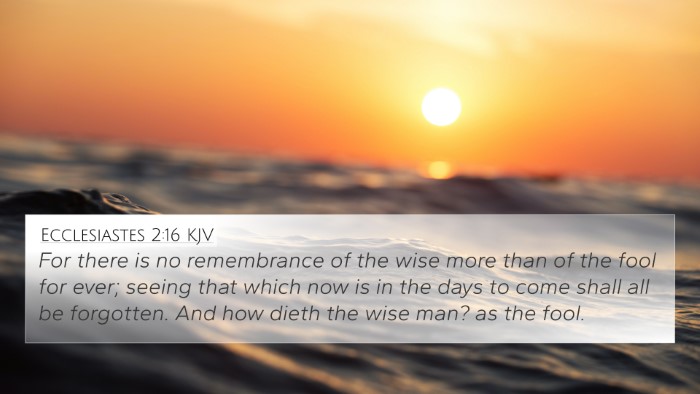Understanding Ecclesiastes 9:15
Verse Reference: Ecclesiastes 9:15 - "Now there was found in it a poor wise man, and he by his wisdom delivered the city; yet no man remembered that same poor man."
Verse Meaning and Summary
Ecclesiastes 9:15 presents a poignant reflection on the nature of wisdom and recognition in human society. In this verse, we find a narrative highlighting the irony of a wise man who saves a city, yet remains unnoticed and unappreciated by those he has helped. This encapsulates the theme of the vanity of human pursuits and the often transient nature of gratitude and recognition.
Commentary Insights
This reflection draws from multiple public domain commentaries:
- Matthew Henry: Henry discusses the contrast between wisdom and wealth, emphasizing that true wisdom is often overshadowed by the more appealing allure of riches and status. He points out that the wise man's humble position leads to his neglect despite his significant contribution to the community's welfare.
- Albert Barnes: Barnes expands on the narrative to suggest that the wise man's moral decision to rescue the city was not performed for fame or acknowledgment. He parallels this event with the life of Christ, who performed many miracles yet remained largely unrecognized by the world. Barnes emphasizes the importance of humility and selflessness in our actions.
- Adam Clarke: Clarke comments on the social dynamics at play, indicating that the wise man symbolizes true wisdom that often goes unrecognized in societies that value power and wealth over integrity. He notes how this theme resonates throughout the wisdom literature of the Bible, portraying the often frustrating reality for those who strive to do good.
Thematic Connections
This verse explores various themes found throughout the Bible, highlighting connections between wisdom, humility, and societal recognition. Below are some relevant themes and cross-references:
- Wisdom vs. Recognition: The conflict between doing good for altruistic reasons and the societal tendency to overlook humble contributions. (Proverbs 11:2, James 4:10)
- The Value of Humility: The story emphasizes that true wisdom is often humble and discreet. (Matthew 5:5, Philippians 2:3-4)
- Irony of Human Recognition: Reflects on how society often forgets the contributions of the meek or poor (Luke 16:15, Matthew 6:1-4).
Bible Cross-References
Here are some Bible verses that relate to Ecclesiastes 9:15 and enrich the understanding of its themes:
- Proverbs 12:15 - "The way of a fool is right in his own eyes: but he that hearkeneth unto counsel is wise."
- Matthew 10:42 - "And whosoever shall give to drink unto one of these little ones a cup of cold water only in the name of a disciple, verily I say unto you, he shall in no wise lose his reward."
- Luke 14:11 - "For whosoever exalteth himself shall be abased; and he that humbleth himself shall be exalted."
- Matthew 5:16 - "Let your light so shine before men, that they may see your good works, and glorify your Father which is in heaven."
- 1 Corinthians 1:26-29 - "For ye see your calling, brethren, how that not many wise men after the flesh, not many mighty, not many noble, are called."
- James 1:9-10 - "Let the brother of low degree rejoice in that he is exalted: But the rich, in that he is made low."
- Proverbs 21:13 - "Whoso stoppeth his ears at the cry of the poor, he also shall cry himself, but shall not be heard."
Additional Themes & Insights
Delving deeper, the examination of this ecclesiastical verse reveals insights into the human condition and the societal constructs that often dictate value and recognition:
- Human Nature and Forgetfulness: The tendency of society to forget those who have made significant sacrifices for the common good.
- The Paradox of Influence: A powerful illustration of how influence does not always correlate with wisdom or virtue.
- God's Recognition: Ultimately, while humans may forget, God sees all deeds done in wisdom and service. (Hebrews 6:10)
Conclusion
Ecclesiastes 9:15 serves as a reminder of the often-overlooked realities of wisdom and the humble contributions that go uncelebrated in society. The verse and its commentaries invite readers to reflect on their own perceptions of recognition and value, leading to a deeper understanding of the Scriptures. Through careful cross-referencing of related biblical texts, the broader themes of humility, wisdom, and societal dynamics unfold, urging us to appreciate the quiet acts of wisdom in our lives and the lives of others.
Tools for Further Study
For those interested in exploring further, utilizing a Bible cross-reference guide can be beneficial. Such tools allow for:
- Identifying connections between Old and New Testaments.
- Engaging in a detailed cross-reference between Gospels.
- Linking themes across different books of the Bible for comparative studies.

